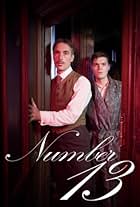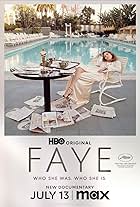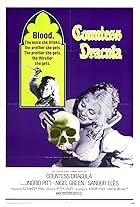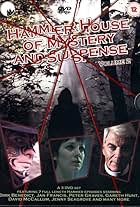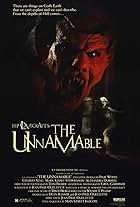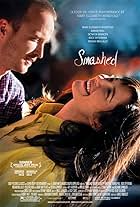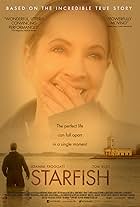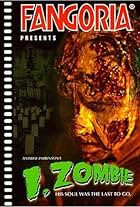Welcome to the new profile
We're still working on updating some profile features. To see the badges, ratings breakdowns, and polls for this profile, please go to the previous version.
Ratings8.6K
Gymnopedies's rating
Reviews83
Gymnopedies's rating
"The Omen" became the cornerstone in horror filmmaking and would also bring the "666" into popular culture spawning many sequels in the subsequent years. It performed very well at the box office, it was a commercial success, grossing well over 60 million USD. The score by Jerry Goldsmith was truly iconic, a spine-tingling piece of music that added an extra layer to the atmosphere of the film. It is a taut and well-paced chiller with dread and an unmistaken feeling of ominousness, a very well-constructed and acted film, with several scenes that really stick in psyche of the horror fan. The scene in which Father Brennan is killed by a falling lightning rod is truly a ghastly death, and the "Look at me Damien! It's all for you!" scene really stick in my mind.
It is well documented that the set was purportedly cursed. The film really seemed to fall victim to a terrible curse. The SFX supervisor's girlfriend was beheaded in a car crash like the photographer in the film. The death of Gregory Peck's son just before filming began. There were many strange and eerie events relating to lighting - Gregory Peck's plane was hit by lighting, as to was producer Mace Neufeld's plane, and the screenwriter David Seltzer flight was as well. A plane that Gregory Peck was to take crashed and would kill everyone on board. There were many other strange incidents that happened that would make you believe the set was really cursed!
It is one of the more genuinely frighting satanic-themed films (along with The Exorcist) that seemed to flood the cinemas in the 1970s. It had a wonderful marketing gimmick in the 'number of the beast', and that played well into the success of the film. It is approaching fifty years since the release of the film, and it still has the ability to disturb its audiences, and ultimately it is a film that marked a milestone in the horror genre.
It is well documented that the set was purportedly cursed. The film really seemed to fall victim to a terrible curse. The SFX supervisor's girlfriend was beheaded in a car crash like the photographer in the film. The death of Gregory Peck's son just before filming began. There were many strange and eerie events relating to lighting - Gregory Peck's plane was hit by lighting, as to was producer Mace Neufeld's plane, and the screenwriter David Seltzer flight was as well. A plane that Gregory Peck was to take crashed and would kill everyone on board. There were many other strange incidents that happened that would make you believe the set was really cursed!
It is one of the more genuinely frighting satanic-themed films (along with The Exorcist) that seemed to flood the cinemas in the 1970s. It had a wonderful marketing gimmick in the 'number of the beast', and that played well into the success of the film. It is approaching fifty years since the release of the film, and it still has the ability to disturb its audiences, and ultimately it is a film that marked a milestone in the horror genre.
"Rosemary's Baby" is widely considered one of the most influential and popular horror films of all time. The film has cemented itself into public consciousness. It is truly the magnum opus of 1960's horror cinema, it uses horror as a vehicle to reflect many contemporary and social concerns of the time. It deals with many themes related to women's liberation, paranoia, Catholicism, and more overtly the occult. The film was nominated for two Academy Award nominations, winning the Best Supporting Actress (Ruth Gordon). In 2014, deemed "culturally, historically, or aesthetically significant" by the Library of Congress and selected for preservation in the United States National Film Registry. Roman Polanski's Repulsion (1965), Rosemary's Baby (1968) and The Tenant (1976) formed "The Apartment Trilogy" - about the horrors of living in an apartment.
The incredible taut atmosphere continues to disturb audiences to this day. Krzysztof Komeda's "Lullaby", sung by Mia Farrow is chilling, and it adds to the foreboding atmosphere of the film. Mia Farrow's performance was outstanding, anxiety-inducing, and utterly compelling. Frank Sinatra and Mia Farrow's marital breakdown during the filming helped her give the performance of her life in "Rosemary's Baby". In essence, "Rosemary's Baby was a massive success, but it wasn't without its hardships, and just like "Poltergeist", "The Exorcist", and "The Omen" - it was purportedly cursed. The film was beset with tragedies including Krzysztof Komeda's death, the horrifying tale of the Sharon Tate murders, the John Lennon connection and other weird coincidences.
Well over 50 years since its release, it remains a prevailing influence in the horror genre, it helped to establish horror through supernatural metaphor's. It is a film saturated in anxiety and paranoia, and that can still frighten audiences to this day.
The incredible taut atmosphere continues to disturb audiences to this day. Krzysztof Komeda's "Lullaby", sung by Mia Farrow is chilling, and it adds to the foreboding atmosphere of the film. Mia Farrow's performance was outstanding, anxiety-inducing, and utterly compelling. Frank Sinatra and Mia Farrow's marital breakdown during the filming helped her give the performance of her life in "Rosemary's Baby". In essence, "Rosemary's Baby was a massive success, but it wasn't without its hardships, and just like "Poltergeist", "The Exorcist", and "The Omen" - it was purportedly cursed. The film was beset with tragedies including Krzysztof Komeda's death, the horrifying tale of the Sharon Tate murders, the John Lennon connection and other weird coincidences.
Well over 50 years since its release, it remains a prevailing influence in the horror genre, it helped to establish horror through supernatural metaphor's. It is a film saturated in anxiety and paranoia, and that can still frighten audiences to this day.
"Psycho" has been rightly regarded as a major work of cinematic art by film critics and scholars alike, who praise it for its wonderful direction, tense and edgy atmosphere, marvelous camerawork, haunting score and masterful performances. It completely revolutionized cinema and would change the horror genre forever. It would be one of the earliest films to set a new level of acceptability for deviant behavior, violence and sexuality in American films, and you could say that it is one of the earliest examples of the slasher genre. It was unprecedented in its depiction of violence and sexuality for it time, partly due to the erosion of the Hays Code. Famously, Walt Disney would refuse to allow Alfred Hitchcock to later film at Disneyland because Hitchcock had made "that disgusting movie, 'Psycho.'
Anthony Perkin's fine performance, an iconic script, and Bernard Herrmann's classic score make "Psycho", a film that will always be remembered as the pinnacle of the horror genre. "The Shower Scene", in which the murder of Janet Leigh's character takes place, in the shower is one of the best-known, and most pivotal, in all of cinema. The sound that the knife makes killing Marion Crane is the sound of a knife stabbing a melon. Alfred Hitchcock originally intended not to have any music for the sequence, but Herrmann insisted that he try his composition, and Hitchcock agreed that it escalated the scene, and would double Herrmann's salary in the process.
Anthony Perkins and Janet Leigh would later say that they did not mind being stereotyped because of their roles in their film, as they "would rather be stereotyped and be remembered forever for this classic movie than not be remembered at all." The more I see this film, the better it gets, it always holds me from the very beginning to the end. It is a film that was on the crossroads of time, and a film that will be forever remembered.
Anthony Perkin's fine performance, an iconic script, and Bernard Herrmann's classic score make "Psycho", a film that will always be remembered as the pinnacle of the horror genre. "The Shower Scene", in which the murder of Janet Leigh's character takes place, in the shower is one of the best-known, and most pivotal, in all of cinema. The sound that the knife makes killing Marion Crane is the sound of a knife stabbing a melon. Alfred Hitchcock originally intended not to have any music for the sequence, but Herrmann insisted that he try his composition, and Hitchcock agreed that it escalated the scene, and would double Herrmann's salary in the process.
Anthony Perkins and Janet Leigh would later say that they did not mind being stereotyped because of their roles in their film, as they "would rather be stereotyped and be remembered forever for this classic movie than not be remembered at all." The more I see this film, the better it gets, it always holds me from the very beginning to the end. It is a film that was on the crossroads of time, and a film that will be forever remembered.








